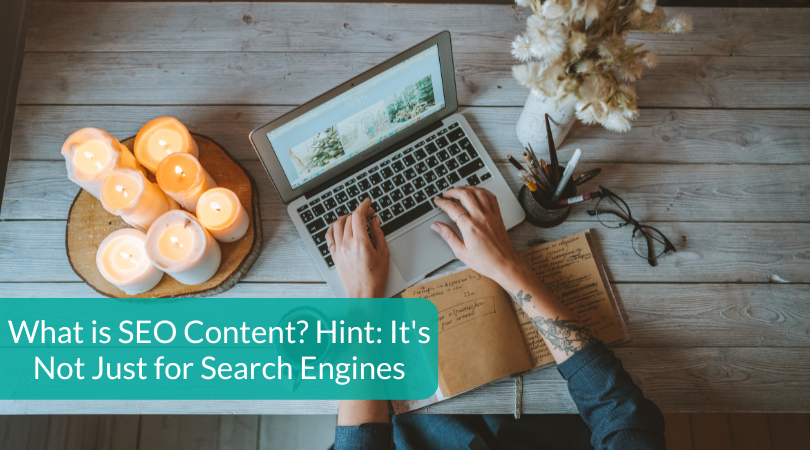
For over a decade, Google has insisted ranking factors include high-quality content when building websites and publishing blog posts. Over the years, Google has taken the time to refine the definition of “high-quality,” most recently clarifying that content quality focuses on total user experience, including page layout, design, images, and content relevancy.
What is SEO Content?
SEO content is any content that’s created with the intention of improving a website’s search engine rankings. This could be anything from blog posts and articles to product descriptions and landing pages.
Good SEO content is keyword-rich (which helps search engines understand it) and informative, original, and engaging (which helps readers understand it). It should also be optimized for on-page SEO, which involves making sure the content is formatted in a way that makes it easy for search engines to index and understand. Creating strong SEO content can be challenging but it’s worth doing if you want your website to rank highly in search engine results pages (SERPs).
On-Page SEO
On-page SEO is one of the most important elements of search engine optimization and is an essential aspect of good SEO content. On-page SEO refers to all the techniques and strategies used to optimize a website to rank higher in search engine results pages (SERPs). The main factors influencing on-page SEO are title tags, meta descriptions, header tags, keyword density, and alt text.
Title tags are probably the most important element of on-page SEO. They are one of the first parts of the page that search bots crawl and the first thing people see in search results. As such, they play a significant role in determining whether or not people will click through to your website. That’s why it’s essential to ensure that your title tags are accurate, relevant, and engaging.
Meta descriptions are another important element of on-page SEO. These short descriptions appear under your website’s title in the search results. They must be well-written and keyword-rich to persuade people to click through to your website.
Header tags are used to structure the content on your website. They help search engines understand your content and make it easier for people to scan through your pages.
Keyword density measures how often a particular keyword or phrase appears on a page. It’s important to strike a balance here – you don’t want to stuff your pages with keywords, but you also don’t want to use them too sparingly.
Alt text is the text that appears in place of an image if the image can’t be displayed. It’s important to use alt text because it helps search engines understand what your images are about and can also help people with visual impairments access your content.
Optimizing your website for on-page SEO is essential to getting good results in search engine rankings. Using the proper techniques ensures that your website is easy for both people and search engines to understand, leading to more traffic and higher conversion rates. Check out our checklist for optimizing blog posts for SEO to learn more.
Should We Write Content for People or Search Engines?
Most people would say we should write content for people, not search engines. However, it is imperative to consider your audience and the search engines when creating an SEO-focused content strategy in today’s digital age.
Here’s a look at why SEO content is important and how you can make it effective.
SEO content is important because it helps your site rank higher in search engine results pages (SERPs). This means more people will likely see your content and click through your website.
Creating high-quality, keyword-rich content is one of the best ways to improve your site’s ranking.
When creating SEO content, it’s important to remember that both people and search engines will be reading it. This means that you must ensure your content is well-written and informative.
Focus on creating a piece of content that is both interesting and useful for your readers. If you do this, the search engines will notice, and your site’s ranking will improve.
Google is Built to Understand Good Content
Good content is content that satisfies a searcher’s query, either to educate, entertain, or inform them. Google’s AI incorporates search intent as a ranking factor. Understanding search intent impacts whether or not your visitors are satisfied with your page’s content.
What makes good content? Well, there are a few key things that you should keep in mind:
- Make sure your content is well-written and free of errors. Google will penalize websites with poor-quality content.
- Use keyword-rich titles and descriptions to help Google understand what your content is about.
- Structure your content in an easy-to-read format using headings and subheadings.
- Include images, videos, and infographics to break up your text and make your content more engaging.
Creating quality content that satisfies search intent is essential for any website that wants to rank well in Google search results. By following the tips above, you can create SEO-friendly content to help your website succeed.
Page Quality Rating
Many factors can influence your page’s quality rating. Generally, the higher your page quality rating, the better your chances of ranking well in search engine results pages (SERPs). Therefore, improving your page quality rating is crucial to enhancing your website’s SEO. Luckily, there are several things you can do in addition to what has already been mentioned to improve your rating. Here are a few tips:
- Improve the usability of your website. This includes ensuring your navigation is easy to use and creating a user-friendly design.
- Increase the number and quality of links pointing to your page. This can be done by guest blogging on high-quality websites and including links to your site, for instance.
- Work on building up the overall reputation of your website. This can be done by ensuring you have a solid social media presence and providing valuable content that people want to share.
Guidelines for High-Quality Written Content
Here are the basics for writing quality content:
- Content should always have a purpose: It should have a topic of interest, an audience, and an intent stage for that specific audience.
- Do your research thoroughly: Get the whole story before you begin tearing things apart. What’s happening now, what happened before, and what happens next.
- Write well and proofread: Use punctuation and grammar, and try to stay focused and on topic. Provide background when needed.
- Google cares about where content comes from. What is the brand or person who created the content? It wants to know. Make sure it can tell. The more authoritative a brand or person’s reputation is, the better.
- Make sure there is substance in your content. Your content has a purpose. Does it fulfill its purpose? And does it explain everything thoroughly? Educate your readers, and they will appreciate and depend on you.
- Always cite your sources. Data and statistics mean nothing unless we know where they come from. Make sure to always cite the source whenever possible.
Search Engines Read Human Language, Not Search Language
Search engines are designed to read human language, not search language. When creating content, you should focus on making it readable and understandable for humans first and worry about keywords second.
This can be a difficult balance to strike, but it’s important to remember that people will be the ones reading and engaging with your content, not machines. So while keywords are still important for SEO purposes, they shouldn’t be your sole focus. Write for people first, and the rest will follow.
Learn about Semantic Search
Keyword Research
There are a lot of different ways to approach keyword research. For example, some people focus solely on finding keywords that will rank well in search engines, while others prioritize finding keywords that will be most relevant to their target audience.
The best approach is a mix of both: finding both popular and relevant keywords. This way, you can attract a large number of potential customers while also ranking high in search engine results pages (SERPs).
Here are a few keyword research tips:
- Use long-tail keywords, which are more specific and tend to have less competition.
- Think about the intent behind a keyword. What are people searching for when they use that keyword?
- Target both broad and narrow keywords. Broad keywords will attract more traffic, but you may have difficulty ranking for them. More limited keywords will be easier to rank for, but they may not get as much search traffic.
- Beware of “keyword stuffing” – cramming too many keywords into your content in an attempt to game the system. Not only will this make your content difficult to read, but it will also turn off potential customers and penalize you by Google.
- Check search volume. Use a keyword research tool to ensure the long-tailed phrase you want to focus your content around has search volume and matches your search intent. Check out our favorite tool, SEMRush, free for 14 days here!
Keyword research is essential to SEO and should be done regularly to ensure that your content is relevant and visible to your target audience. By following the tips above, you can produce content people are looking for and improve your chances of ranking high in SERPs.
SEO Content Writing Should Target Your Ideal Buyer
Your SEO content needs to be compelling and valuable for your target audience, but it must also be optimized for search engine ranking. Remember that people are the ones who ultimately decide which content is successful. If your content is interesting, informative, or engaging, people will share it, link to it, and come back for more. But they’ll quickly move on if it’s not well-written or relevant.
That said, there’s no point in writing great content if no one ever sees it. That’s where search engine optimization (SEO) comes in. Optimizing your content for certain keywords and phrases ensures that it appears higher in search results and thus gets seen by more people.
The bottom line is that you need to write great content that’s optimized for both people and search engines. Then, with a little effort, you can reach a wider audience and build a successful online presence.